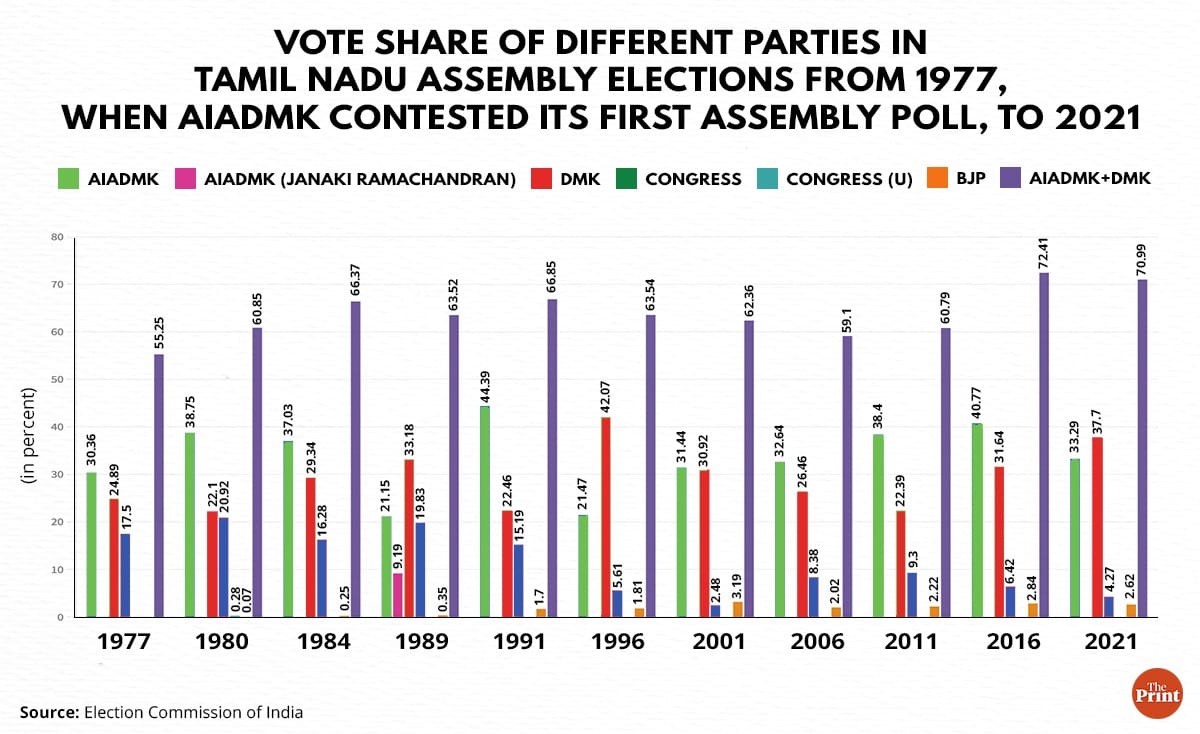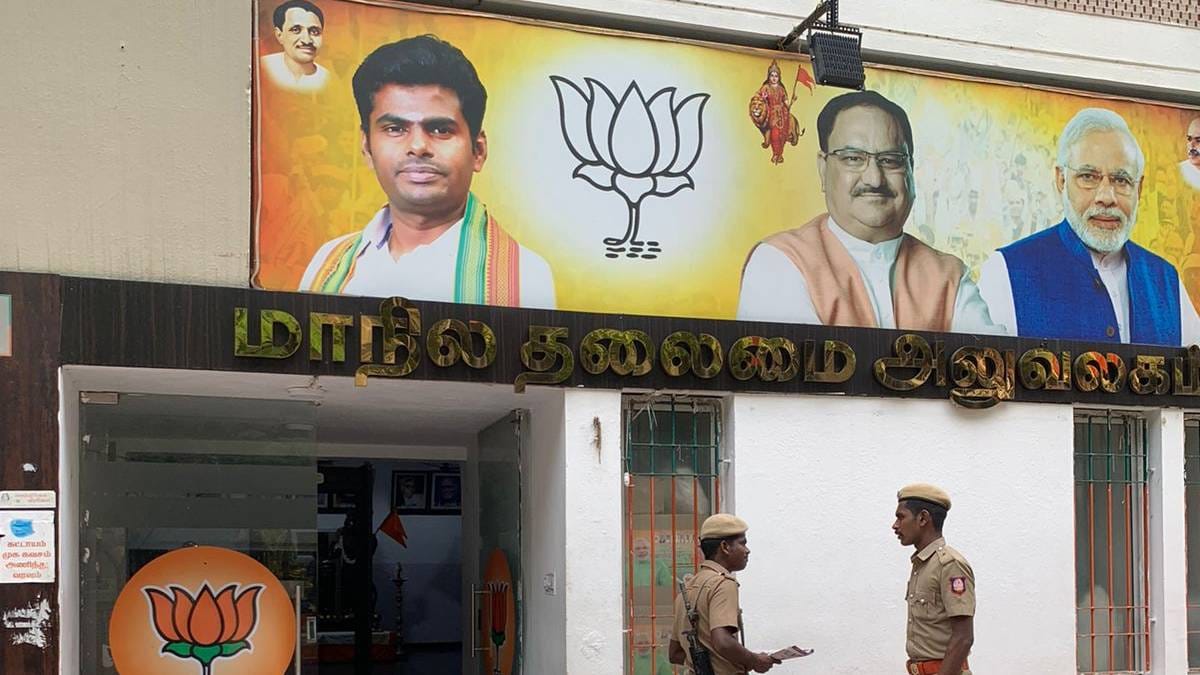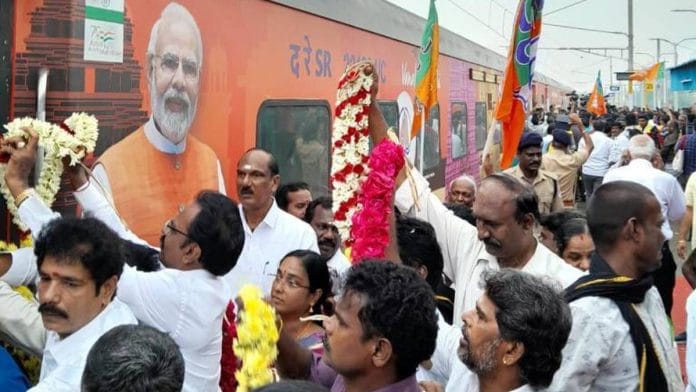Chennai: Last month, K. Annamalai, the president of the Bharatiya Janata Party’s (BJP) Tamil Nadu unit rested in the hut of a tribal family in Erode district’s Bargur village. When he shared it on social media, he made it a point to mention that next to the simple hut, a permanent house was being built for the family under the Union government’s Pradhan Mantri Awas Yojana (PMAY), a scheme for affordable housing launched in 2015.
Today @BJP4TamilNadu commemorated “Tribal Pride day” along with our Tribal brothers & sisters in Bargur Village in Erode and had the opportunity to discuss the schemes of our Hon PM Thiru @narendramodi avargal aimed specifically for the welfare of our Tribal community. (2/3)
— K.Annamalai (@annamalai_k) November 15, 2022
Last year, Annamalai zealously led his party’s cadre in protests at 12 of Tamil Nadu’s major temples against the Dravida Munnetra Kazhagam (DMK)-led government’s decision to keep places of worship closed on weekends.
In between such field visits and protests, the former IPS officer-turned-politician keeps making statements about Tamil pride and how the BJP’s Tamil Nadu unit is against the “imposition of Hindi” in the state.
The issues endorsed by Annamalai, in a nutshell, define how the BJP is trying to position itself in Tamil Nadu, attempting to take advantage of a vacuum in the state’s opposition.
While the BJP is still a political lightweight in Tamil Nadu, its aggression in the state is, however, making the DMK wary, with leaders of the regional party criticising the BJP as if it were the principal opposition.
“The BJP, being in power in the Centre, has influence and media attention and so it is able to set the narrative,” said Salem Dharanidharan, DMK spokesperson. “Our narrative is unfortunately limited to the state.”
Meanwhile, the principal opposition and the BJP’s ally — the All India Anna Dravida Munnetra Kazhagam (AIADMK) is watching helplessly, as it fears some of its anti-DMK vote being cannibalised by its ally, said political analysts.
The AIADMK is beleaguered with a factional war, opening up an opportunity for the BJP to fill the opposition space, even if in rhetoric. Similarly, the Congress, DMK’s ally, is self combusting owing to infighting in the party, the analysts added.
In this backdrop, the BJP is trying to bust the concept of Dravidian politics, despite Tamil Nadu having given consistently strong mandates to Dravidian parties. The BJP’s most recent effort seems to be the ongoing Kashi Tamil Sangamam in Varanasi, aimed at “rediscovering age-old ties” between Tamil Nadu and Kashi.
The BJP in Tamil Nadu is looking to shake off its Brahmin party tag, trying to highlight the Centre’s work in the welfare of a state that has always voted with a strong sentiment for federalism, and attempting to consolidate a Hindu vote bank, whipping up an appetite for religion-based politics in a state that has never voted on religious lines, claimed Tamil Nadu-based BJP leaders and political observers.
However, according to the observers, breaching the ramparts of decades-old Dravidian politics with little-to-no space for national parties, and selling a Hindutva party in a state where the ‘us versus them’ is not Hindus and others, but Tamilians and others, will be a tall order.
“The BJP has built some base at the grassroots here. They are using the anti-Dravidian politics card. They target the Dravidian parties, particularly the DMK, on dynastic politics. But it remains to be seen if this will get the BJP adequate numbers to swing it,” Maalan Narayanan, a Tamil and English writer and Chennai-based political commentator, told ThePrint.
Also read: Decoding VCK — chief says ‘anti-Manusmriti’ stance benefits all minorities, not just Dalits
Dravidian politics and strong mandates
The roots of Dravidian politics lie in the South Indian Liberal Federation, which was founded in 1916 and was known popularly as the Justice Party. It stood for anti-Brahmisim and social justice.
In 1938, the Justice Party and the Periyar (E.V. Ramaswamy Naicker)-led Self Respect Movement came together and the new outfit was named Dravidar Kazhagam in 1944. It called for a ‘Dravida Nadu‘, an independent Dravida nation.
In 1949, former Tamil Nadu Chief Minister C.N. Annadurai split from the Dravidar Kazhagam over ideological differences and founded the DMK, which started contesting elections. Annadurai did not drive the agenda of a ‘Dravida Nadu’, but of late, a fierce Union versus state battle and the BJP’s aggressive attempts at foraying into Tamil Nadu have prompted leaders to indirectly articulate the demand.
“The CM (M.K. Stalin) is walking on Anna’s (Annadurai’s) way, don’t push us to Periyar’s way,” DMK leader A. Raja had said in July this year.
In 1967, a DMK-led coalition government had come to power with a thundering victory, with DMK alone winning 137 of 234 assembly seats and fetching over 40 per cent of the vote share. Since then, no national party has been able to form a government in Tamil Nadu.
Actor M.G. Ramachandran founded the AIADMK in 1972, as a breakaway faction of the DMK. The AIADMK first tasted power in the state assembly in 1977, and between then and now, the seat of power has swung between the two Dravidian parties. The two parties have since then collectively accounted for more than 55 per cent of Tamil Nadu’s vote share, according to Election Commission (EC) data.
“The state has always given very decisive mandates in favour of its regional parties, which shows that people don’t want the Centre’s influence,” A.S. Panneerselvan, fellow, Centre for Study in Public Sphere, told ThePrint. “Like any other state, this state also opts for a change in government, but the will of the people is not manipulated by the distant Centre. It comes from within,” added Panneerselvan, who has authored a biography of late Tamil Nadu CM and DMK leader, M. Karunanidhi.
To Panneerselvan’s point, the EC data further shows that the preference for Dravidian parties has been evident even more strongly in the past two elections — 2016 and 2021—with more than 70 per cent of Tamil Nadu’s voters having chosen either the DMK or the AIADMK.
In 2021, the AIADMK’s vote share was 33.29 per cent, 4.4 per cent less than the DMK’s, even when the former was fraught with internal differences following the death of its leader and former CM, J. Jayalalithaa, in December 2016.

What makes breaking the stronghold of Dravidian politics even more difficult is the fact that Tamil Nadu’s welfare indices have consistently been better than most other states. A BJP functionary told ThePrint, “We cannot target the parties here on performance. What we can talk about is corruption and dynastic politics.”
Meanwhile, the vote share of the Congress, the only national party that had a base in Tamil Nadu mainly due to the following that party leaders such as K. Kamaraj and C. Rajagopalachari commanded, has steadily declined from 15.19 per cent in 1991 to 4.27 per cent in 2021, according to EC data.
But, the BJP is trying to negate Dravidian politics by alleging that the Dravidian parties have given the Dravidian ideology a divisive flavour. “Dravida in Sanskrit refers to a place. It is not a race. But they (Dravidian parties) have made it a Dravidian versus Aryan debate,” Srikanth Karunesh, secretary to Annamalai, told ThePrint.
Srikanth defended the BJP’s alliance with the AIADMK, saying the party is speaking DMK’s language to get its goodwill, but is different in ethos. “They are talking about nation building. The AIADMK, however, cannot completely come out of the shadow of being a Dravidian party, because that would mean giving the DMK a walkover,” he said.
AIADMK spokesperson Kovai Sathyan rejected this statement, insisting that the BJP and AIADMK were ideologically “very different”.
“The BJP-AIADMK do not share the same ideology, but when it comes to delivering public welfare this alliance helps. If you want to deliver good for the people it is important to have an understanding with the party at the Centre. It is of paramount importance,” he added.
According to EC data, between 1991 and 2021, the BJP’s vote share in the state has only marginally inched up from 1.7 per cent to 2.62 per cent.
But, DMK leaders are cautious about its ambitions. Last month, state cabinet minister, Durai Murugan, told party cadres that this time (in the next election) they have to face a “rakshasa (demon)” and that the BJP is transforming like a monster.
Also read: Southern states make most use of Modi’s govt’s PMJAY health scheme, Tamil Nadu 1st, data shows
BJP’s Tamil Nadu push
At Kamalayam, the BJP headquarters tucked away in a narrow bylane of Chennai’s T Nagar, Srikanth was working the phones, next to a bust of Annamalai, when ThePrint visited last week. He was coordinating two field tours that the Tamil Nadu BJP president was scheduled to go on over the next two days.

“He (Annamalai) is almost always on the road, among people. His Tamil is not literary or classical. He speaks the colloquial Tamil that the common people speak. He visits the houses of our karyakartas (cadre) at the lowest level. He is shrewd, and the people and media like his straight talk,” Srikanth told ThePrint, emphasising how Annamalai was trying to dispel the notion of BJP as a “distant Hindi-oriented national party”.
“If Annamalai ji is accepted, the BJP is accepted,” he added.
Annamalai, a member of the other backward Ccasses’ (OBC) Gounder community — like the BJP’s previous state chief L. Murugan from the Scheduled Castes — is the BJP’s bet to move away from its elitist Brahmin image.
The BJP is also trying to project Annamalai as a leader with a halo, according to party insiders and political observers, considering how Tamil Nadu’s political discourse has been dominated by charismatic leaders, starting from K. Kamaraj and C.N. Annadurai to Jayalalithaa and Karunanidhi.
So when state BJP leaders talk about Annamalai, they make him seem larger than life. “With his IPS experience, he smells scams even before they happen. He sits in his office with a bunch of papers scattered around his desk. It is like he takes photographs with his eyes because he goes out and talks about them citing every data, every section,” a BJP leader told ThePrint.
Panneerselvam, however, said Annamalai’s caste will prevent him and the BJP from having a state-wide appeal. Gounder is a dominant caste in Western Tamil Nadu, and so far most of the “charismatic” leaders have come from minority castes, he said. “When you are from a dominant caste, you are seen as anti-others,” he claimed.
According to party leaders, the central BJP leadership is consciously doing its bit with Prime Minister Narendra Modi quoting from Tamil classics and referring to Tamil as the “world’s oldest language”, and moves such as organising the Union government’s Kashi Tamil Sangamam in Varanasi, and a carpet bombing of cabinet ministers to review implementation of Union schemes in the state.
Like its ground infrastructure in other states, the BJP is trying to implement its booth committee model in Tamil Nadu too.
Party spokesperson for Tamil Nadu, Narayanan Thirupathy told ThePrint that about 50 per cent of the work is complete. “As of now, we have 13 people to reach every 1,000 voters,” he said, adding the party has set up a host of committees in line with Tamil Nadu’s political needs.
“A Central schemes committee monitors the implementation of Union government schemes in the state. They collect data on how the schemes are functioning, the beneficiaries and the people these schemes can potentially help constituency wise, village wise and booth wise,” Thirupathy said.
Another ‘sports and youth empowerment committee’ takes up projects and programmes for the state’s young voters, while a spiritual and temple affairs committee is the one that drives the BJP’s Hindutva agenda in Tamil Nadu.
Hindutva in Tamil Nadu
According to BJP leaders, the party is mindful of the fact that a Hindutva agenda will not cut ice with the state’s voters. Tamil Nadu has never been under Islamic rule and the rhetoric of “Muslim invaders” doesn’t work in the state. The sentiment of being a Tamilian is much stronger than any religious belonging, they added.
According to the 2011 Census, 87.5 per cent of Tamil Nadu’s population is Hindu, 5.8 per cent are Muslims, 6.12 per cent are Christians, while the rest are Sikhs, Buddhists, Jains or from other religions.
“People will not accept a campaign on core Hindutva here. But, Dravidian parties have been focussing on appeasing Christians and Muslims, thinking it will not impact their Hindu vote base,” said Thirupathy.
He added: “The people of Tamil Nadu are god-fearing. There are huge temples here. We are only talking about culture. We explain to them that we want to preserve temples.”
Party leaders cite examples such as how an Ayodhya Satsang Mandapam in Chennai was abruptly brought under the state government’s temple trust “though it technically wasn’t a temple”.
“But, on the day of Ram Janmashtami, they locked it up. We went there, fought with the government. The people were very angry. We got the government to open the mandap and hand it back to the trust,” a BJP leader said.
Writer Maalan Narayanan said while the verdict is still out on whether the BJP’s Hindu card will work in Tamil Nadu, the party has forced all parties to take positions on Hindutva.
“The DMK is supposed to be an atheist party, but even (CM) Stalin’s wife goes from temple to temple, performing yajnas while saying they are not atheist, but they are for one God. This is like Rahul Gandhi’s soft Hindutva,” he alleged.
Leaders from both the AIADMK and DMK told ThePrint that while atheism was at the root of the Dravidian ideology, the parties and their leaders have evolved to be rationalists. And both unequivocally claimed that the BJP’s agenda won’t work.
“The BJP has a religious bias. This land has always seen religious harmony. Linguistic and religious divisions do not work in Tamil Nadu,” Kovai Sathyan, a AIADMK member, said.
He added: “The BJP may say that they are not openly standing for Hindutva, but in the minds of the people, the BJP is doing it openly, talking about conversions, other religions.”
A DMK functionary who did not wish to be named said the BJP was compelled to take up Hindutva here because of its national agenda.
“The party knows fully well that it won’t have any immediate results. But, they have power at the Centre and by extension the ability to influence, so we are being cautious,” he added.
(Edited by Poulomi Banerjee)
Also read: Varanasi’s mini-Tamil Nadus live in mutts, family shivalayas and stories of saints






